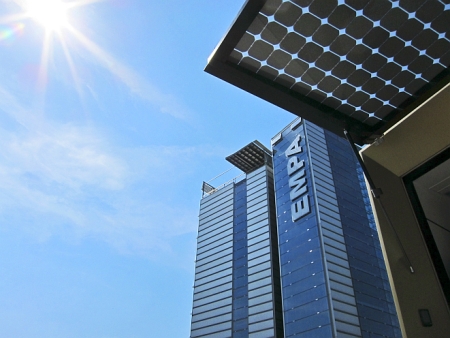Empa, an interdisciplinary Swiss research and service institution for applied materials sciences and technology, has initiated an EU-funded project, called SCALENANO, to develop efficient and low-cost solar cells.
 Photovoltaics at Empa
Photovoltaics at Empa
The research institute, Swiss Federal Laboratories for Materials Science and Technology, has instituted the SCALENANO project along with 13 partners from throughout Europe. This major European research project, estimated to cost 10 million Euro, will focus on the development of photovoltaic modules and devices based on thin film technologies. The SCALENANO project will run until mid-2015.
Compared to wafer-based silicon solar cells, thin film photovoltaic technologies have a capacity to offer lower module costs and higher material application because they use light-absorbing materials that are roughly 100-times thinner compared to silicon wafers. Devices that are rooted on the substance class of chalcogenides, including copper indium gallium (di)selenide, manifest the maximum efficiencies of thin film solar cell technologies and are already in the mass production stage. But, existing production methods depend upon vacuum deposition processes that are not easy to control over huge surfaces and need expensive equipment, and these methods hinder the potential minimization of material costs.
The EU-funded project, which will focus on the development and increase of nanostructured-based processes and materials for low-cost and high-efficiency chalcogenide-based solar cells, will take up this task by developing new vacuum-free processes rooted on the electro-deposition methods of nanostructured precursors. It also includes the investigation and advancement of alternative processes together with high-throughput as well as process rates and their expansion to Cu2ZnSn(S,Se)2-based absorbers that use abundant and inexpensive elements.
The research team at Empa's laboratory for Thin Film and Photovoltaics, headed by Ayodhya Tiwari, will also contribute to the project.